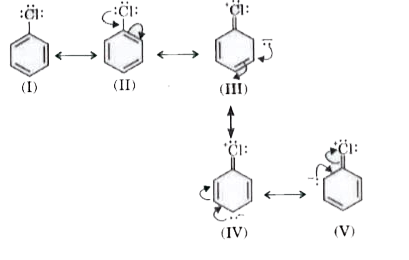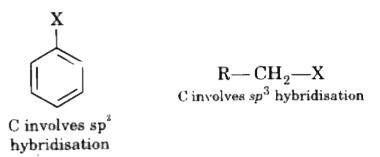Haloarenas are less reactive than haloalkanes and haloalkenes. Explain.
Video Solution
Text Solution
Haloarenes are much less reactive than haloalkanes and haloalkenes towards nucleophilic substitution reactions because of the following reasons:
1. Resonance effect: In haloarenes, there is delocalisation of electrons due to resonance. For example, chlorobenzene is considered to be a resonance hybrid of the following structures:

It is evident that the contribution of structures III, IV and V imparts a partial double bond character to the carbon-chlorine bond. This is confirmed by X-ray analysis which shows that the C-Cl bond length in chlorobenzene is 1.69∘A while the C-Cl bond length in ethyl chloride molecule is 1.82∘A. The shortening of bond length imparts stability to aryl halides and the bond cleavage becomes rather difficult. The aryl halides are, thereforo, less reactive than alkyl halides.
In haloalkenes also, the filled p-orbital of halogen atom cannot overlap sidewise with the unhybridised p-orbital of C atom. Therefore, C-Cl bond is not very strong and can be easily cleaved.
2. Different hybridisation states of carbon atom : In haloalkanes the carbon atom of the C-X bond is sp3 hybridised while in haloarene halides, the carbon atom is sp2 hybridised. The sp2 hybridised carbon atom with a greater s-character is more electronegative. It can hold the electron pair of the bond more tightly than the sp3 hybridised carbon atom in alkyl halides. Therefore, it has less tendency to release electrons to the halogen. As a result, the bond cleavage in aryl halides is some what more difficult than in alkyl halides.

Thus, haloarenes are less reactive towards the substitution reactions than haloalkanes.
|
Topper's Solved these Questions
- HALOALKANES AND HALOARENESBOOK - MODERN PUBLICATIONCHAPTER - HALOALKANES AND HALOARENESEXERCISE - NCERT examplar Problems (Matching Type Questions)
6 Videos
- HALOALKANES AND HALOARENESBOOK - MODERN PUBLICATIONCHAPTER - HALOALKANES AND HALOARENESEXERCISE - NCERT examplar Problems (Assertion and Reason Type Questions)
10 Videos
- HALOALKANES AND HALOARENESBOOK - MODERN PUBLICATIONCHAPTER - HALOALKANES AND HALOARENESEXERCISE - NCERT examplar Problems (Multiple Choice Questions (Type-II))
12 Videos
- GENERAL PRINCIPLES AND PROCESSES OF ISOLATION OF ELEMENTSBOOK - MODERN PUBLICATIONCHAPTER - GENERAL PRINCIPLES AND PROCESSES OF ISOLATION OF ELEMENTSEXERCISE - COMPETION FILE (Integer Type Numerical Value Type Questions)
5 Videos
- ORGANIC COMPOUNDS CONTAINING NITROGEN BOOK - MODERN PUBLICATIONCHAPTER - ORGANIC COMPOUNDS CONTAINING NITROGEN EXERCISE - UNIT PRACTICE TEST
5 Videos
Similar Questions
Knowledge Check
Ketones are less reactive than aldehydes because
AC = O group is less polar in ketonesBof electromeric effectCsteric hindrance to the attacking reagentDnone of theseKetones are less reactive than aldehydes because
AThe + I-effect of the alkyl groups increases the electron deficiency of the carbonyl carbonBThe + I-effect of the alkyl groups decreases the electron deficiency of the carbonyl carbonCOf steric hindrance to the attacking nucleophileDBoth (b) and (c) options are correct
Haloarenes are less reactive than haloalkanes, why?
View SolutionWhy haloarenes are less reactive than haloalkanes ?
View SolutionExplain as to why haloarenes are much less reactive than halo-alkanes towards nucleophilic substitution reactions.
View SolutionExplain as to why haloarenes are much less reactive than haloalkenes towards nucleophilic substitution reactions.
View SolutionWhy haloalkanes are more reactive than haloarenes?
View Solution(a) Why are haloarenes less reactive than haloalkanes? (explain with resonance and hybridization).
(b) Explain substitution nucleophilic bimolecular (SN2) reaction.
(c) Define Optical activity.
View Solution
